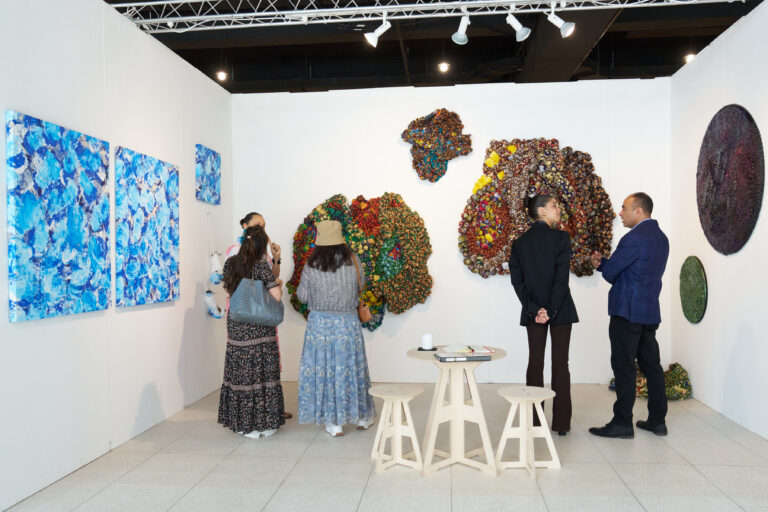Modern mythology offers tales of kidnapped Africans thrown overboard or who liberated themselves from slave ships during the trans-Atlantic slave trade. Among the stories are those of Black mermaids and water spirits that welcomed and guided the new ancestors upon entering the water. In the 2018 Black Panther movie, Kilmonger (Michael B. Jordan) said, “bury me in the ocean, with my ancestors that jumped from the ships, because they knew death was better than bondage.”
Enter mixed media artist Alisa Sikelianos-Carter, who makes a significant Afrofuturist contribution to Afro-Atlantic aquatic mythology with her debut solo show, Stars Are Born in Darkness. The 16 medium-to-large-scale works on paper and linen are on display at Kavi Gupta’s Chicago Elizabeth Street location now through June 11, 2022.
Stars Are Born in Darkness forms its own cosmology of loss and life with work created in 2022, except for Meet Me on the Other Side (2021). The story opens with Hands of Fortuna (Sea Asteroid of Fate) (2022). At the heart of a sphere are several dozen black, outstretched hands that feel juxtaposed with black coral that borders an asteroid. Symbols appear to be reimagined and assigned multiple meanings throughout the series: asteroid crater or the texture of coral reef; cell, chain or link; hair or breathing apparatus; coral or roots.
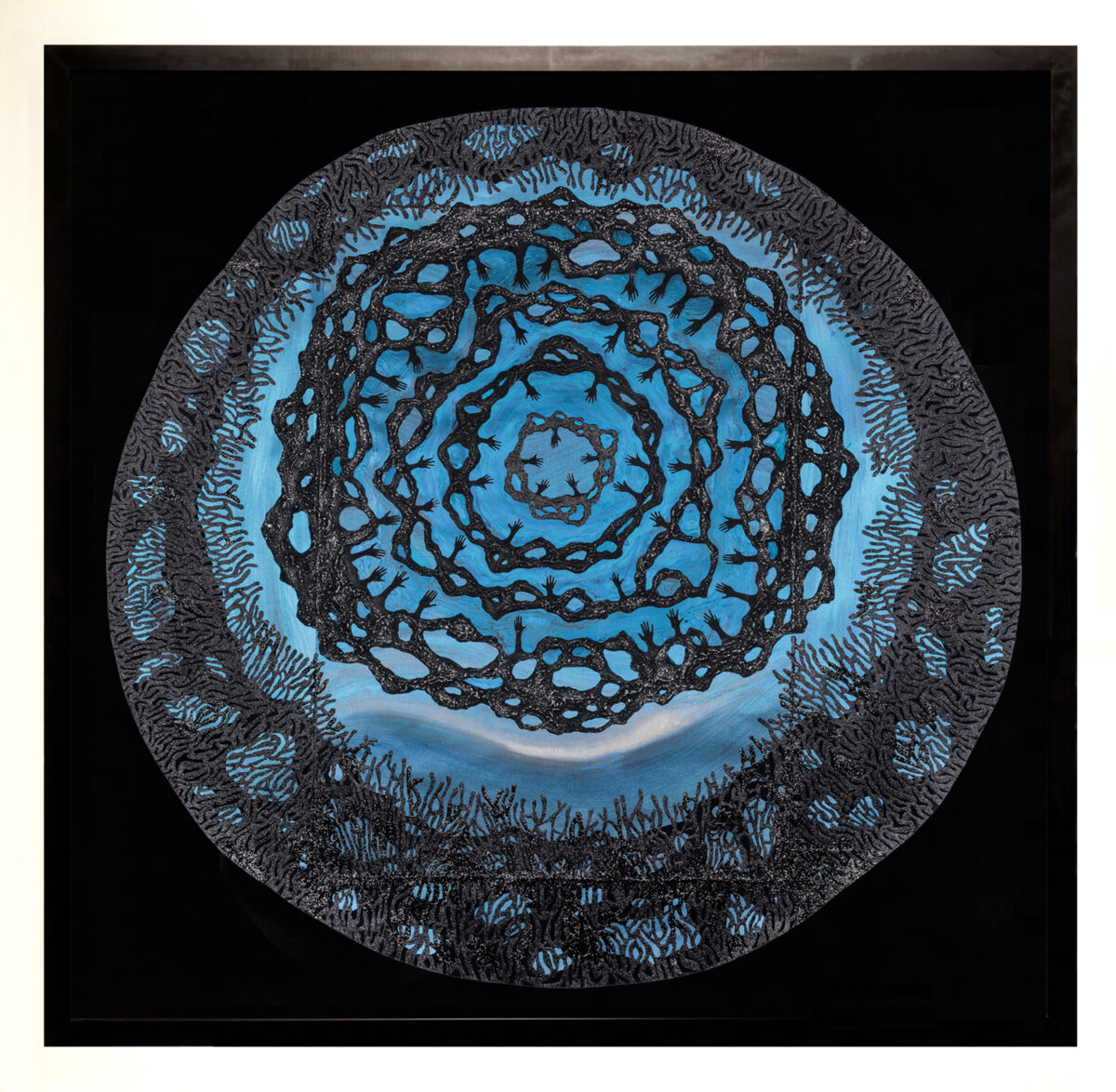
Above: Fortuna (Sea Asteroid of Fate) | acrylic, gouache, pearl mica, black mica, and glitter on archival paper | 62-5/8 x 60–5/8 inches | 2022 | Courtesy of Alon Koppel Photography
The use of materials such as mica, glitter and glass add dimension and reflect light like stars in an infinite sky or sun and moon shimmering across a body of water. These materials also are used to create intricate patterns on the large-scale figurative works, many of which present like ancestral profiles. In addition, Sikelianos-Carter skillfully captures the surreal motion and view of being underwater and the way the sun creates a tunnel of sight, particularly in To Be Held (2022), with its five outstretched hands. Are they turning their body into a single plane and gliding toward the water’s surface? Are they reaching for rescue and refuge?
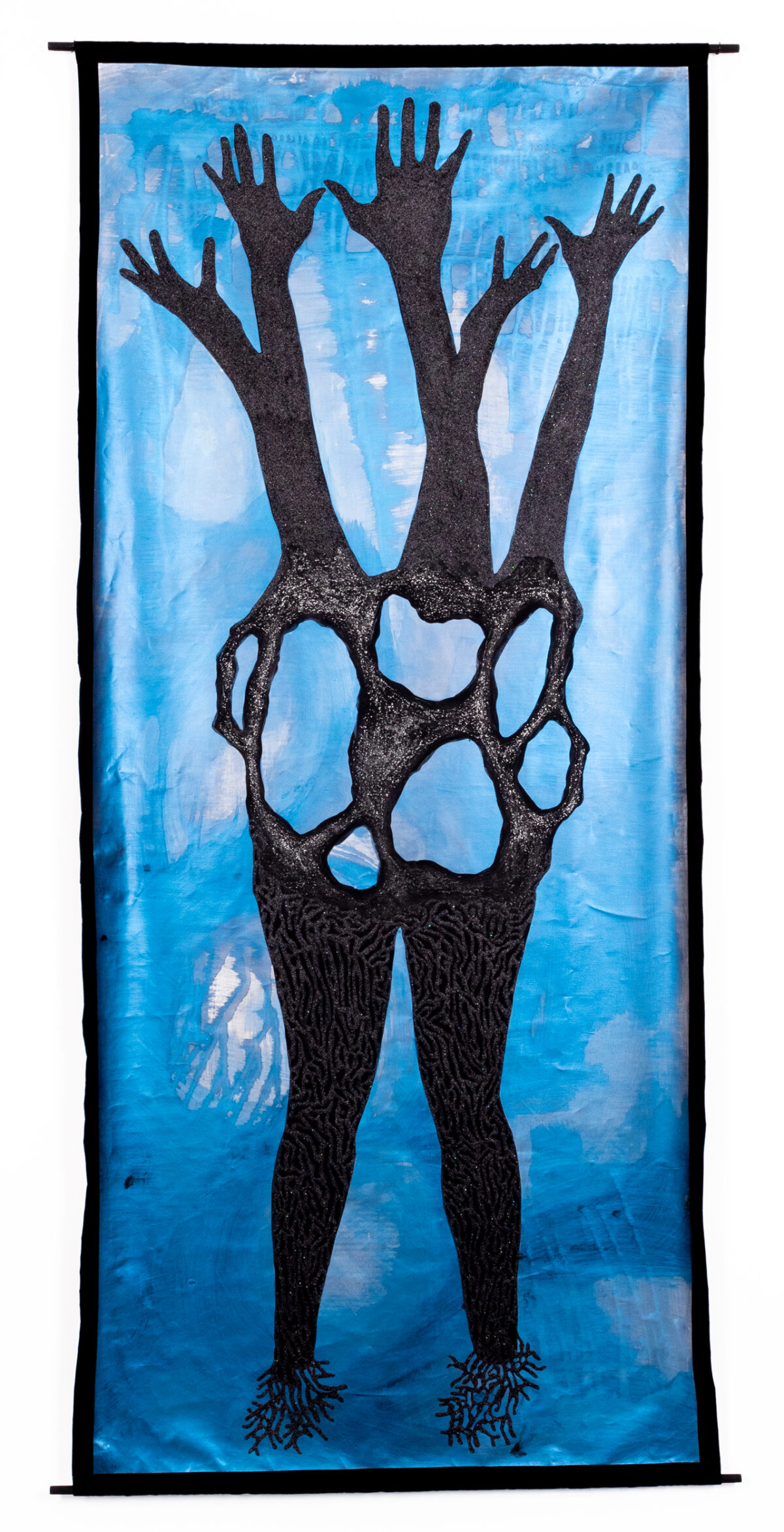
Above: To Be Held | acrylic, gouache, pearl mica, black mica, and glitter on linen with velvet | 44 x 101 inches | 2022 | Courtesy of Alon Koppel Photography
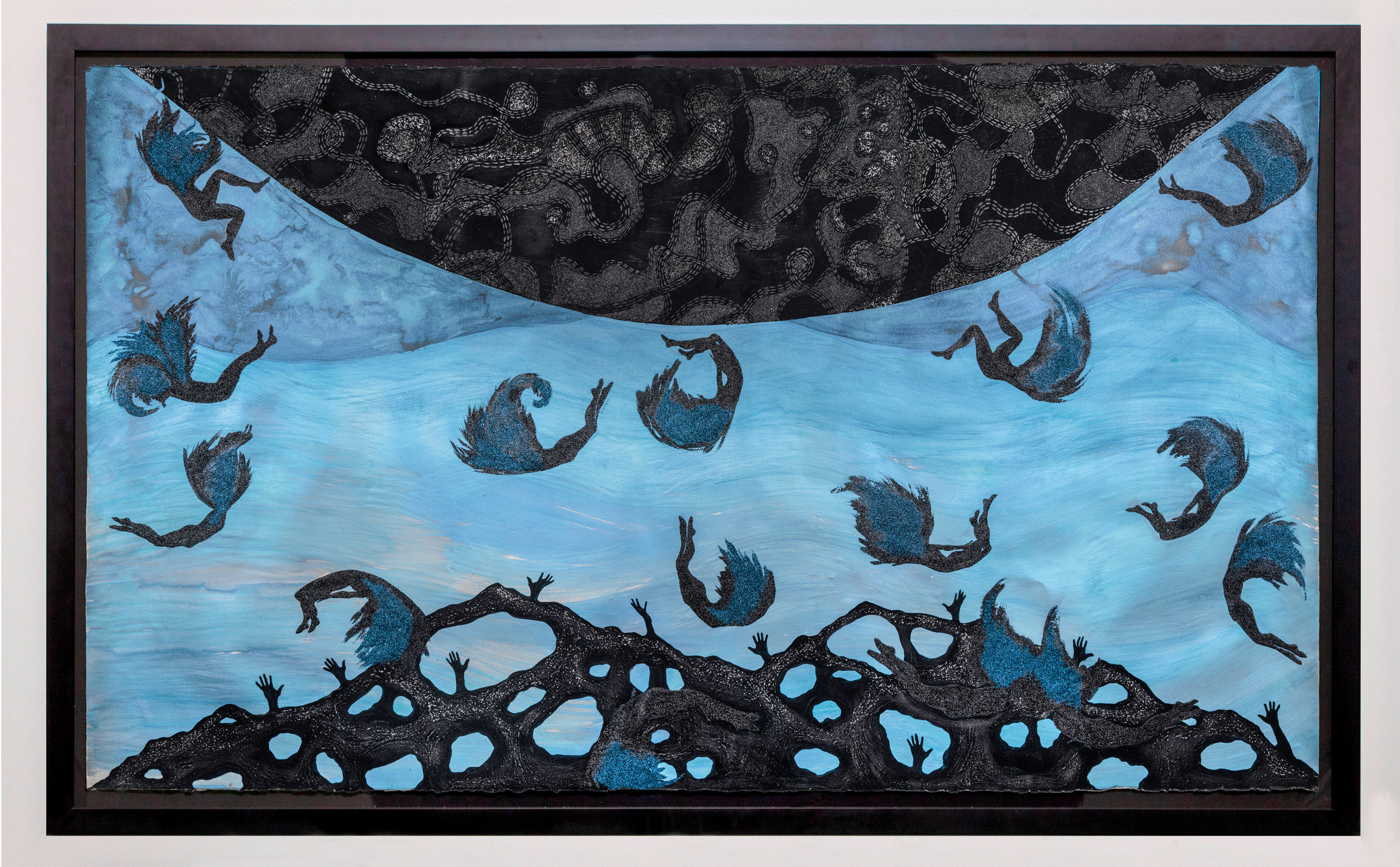
Above: There’s a Wave in Every Cell | acrylic, gouache, pearl mica, black mica, and glitter on archival paper. 47-5/8 x 77-1/8 inches | 2022 | Courtesy of Alon Koppel Photography
We see the falling African ancestors from the painting, There’s a Wave in Every Cell (2022), transform into what the show’s description identifies as “Afronauts” in five of the paintings. The term Afronauts was first used by Edward Makuka Nkoloso to describe members of his Zambian space training program (Faces of Africa 09/09/2013 Makuka Nkoloso: The Afronaut, China Central Television, last modified Sept. 9, 2013).
Filmmaker Nutoma Budoma captured this story in her 2014 short film by the same title. Sikelianos-Carter helps us imagine where the sea and sky meet. Where the physical world meets the spiritual world. These paintings, each created in 2022, magnify how water can be both a site of healing and harm: A Choreography of Choices; An Order of Light; Wild Delight; A Blessing; The Sound of Absolute Freedom.
They present a galactic underworld of possibility as additional colors are introduced to the foundational palette of blues and blacks. Greens, purples, blues and metals (gold, copper, silver) not only shift our gaze, but they shift the energy. This set of paintings is, at times, both playful and haunting. I want to imagine these same ancestors, who might have emerged from a strong aquatic culture, reclaiming their bodies and finding more freedom in this dimension than had been afforded to them.
The Afronauts’ hair, now refashioned as a survival apparatus, appears as one of the repeated motifs found throughout the series. The illuminated planetary rings around the ankles of those swimming underwater feel representative of what were once shackles. Perhaps this scene is not interested in bypassing the difficult truths of tragedy but does not want the story to remain there. In The Sound of Absolute Freedom (2022), there seems to be a clearing or even a portal of quiet resolution. How might these imaginings bring healing for Black lives lost or fractured by the sea in a recent past, including people forced to flee their homelands, represented in films such as Atlantics (2019), His House (2020) and Nann (2022)?
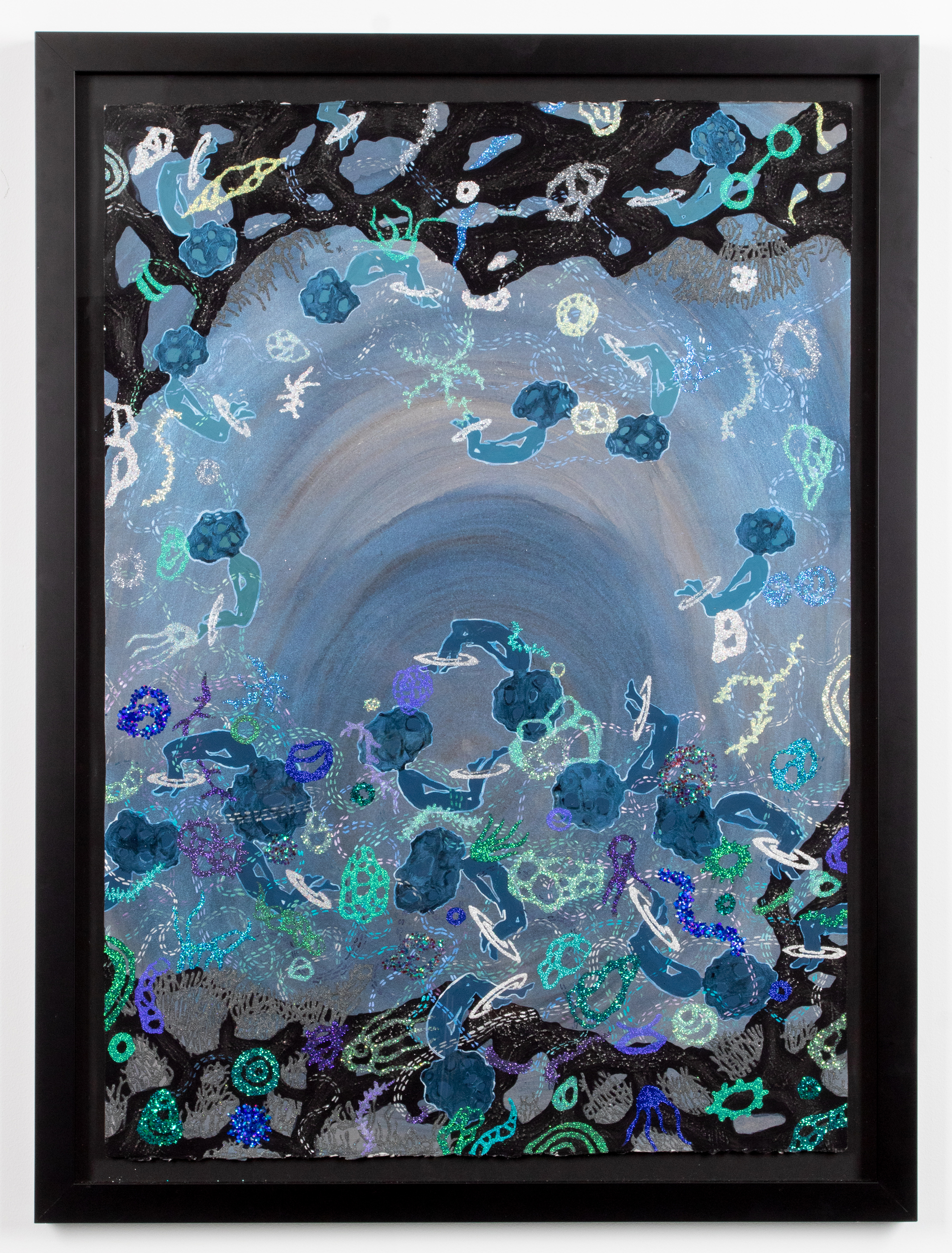
Above: The Sound of Absolute Freedom | acrylic, gouache, pearl mica, black mica, glass, glitter, micaceous iron oxide, and abalone shell on archival paper | 35-3/8 x 47-5/8 inches | Courtesy of the artist
The exhibition also features prints of collages of braided Black hair patterns in a variety of styles, colors and adornments as Sikelianos-Carter believes that Black hair “is gifted from the divine to help us survive and flourish.” (Source: Alisa Sikelianos-Carter’s Stars Are Born in Darkness, last modified April 2022)
These prints represent one form of intelligence passed down through generations. We witness additional transfers of wisdom in The Greater the People the Wider the Cascade (2022) and Mind of My Mind (2022), an assumed nod to the same-titled Octavia Butler novel about telepathy.
Sikelianos-Carter’s offering rounds out by bringing into view a time when the “Afronauts first make contact with members of a sacred kinship called The Future Ancestors” (Source: Alisa Sikelianos-Carter’s Stars Are Born in Darkness, last modified April 2022) in Looking Forward and Backward and Upward and Through; Black into Blue, Me Onto You (II) (2022). The large spectacular green and purple figures are holding hands and covered in detailed, iridescent patterns. One is sporting a large asteroid Afro while the other’s crown is comprised of a constellation of Black hairstyles, including Bantu knots and braids reminiscent of antennas. It is a fantastical end to an epic tale of what it means to reimagine survival.

Above: Mind of My Mind | acrylic, gouache, pearl mica, black mica, and glitter on archival paper | 26-3/8 x 77-3/8 inches | Courtesy of Alon Koppel Photography
Kavi Gupta
219 N. Elizabeth Street
Chicago, IL 60607
April 8-June 11, 2022
